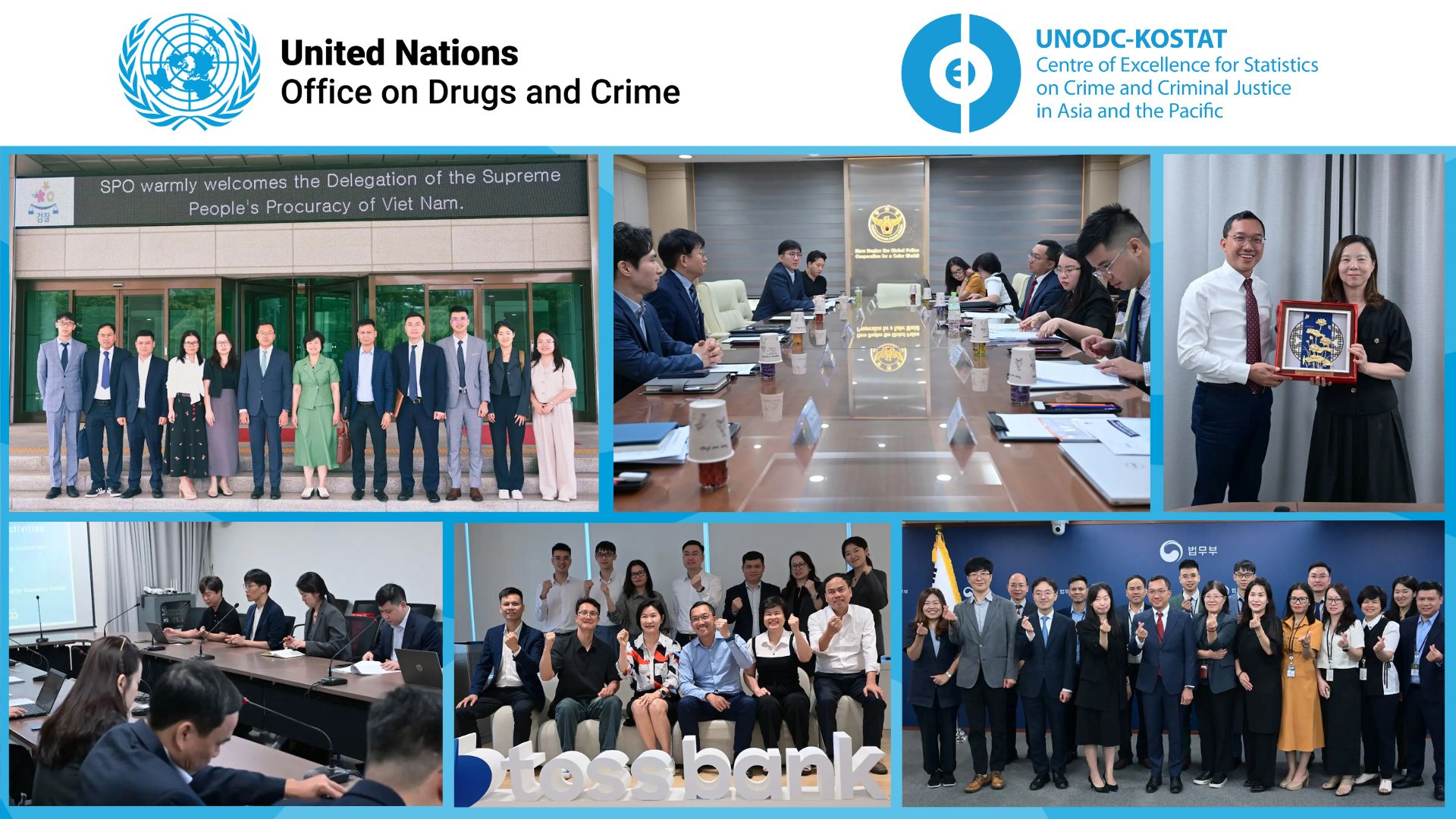
Seoul, Republic of Korea, 8–12 September 2025 – A high-level delegation from Viet Nam’s Supreme People’s Procuracy (SPP) and the Viet Nam Posts and Telecommunications Group (VNPT) visited Korea to learn from its experience in digital transformation and cybersecurity of the justice system. The study visit was organized with support from the UNODC-KOSTAT Centre of Excellence (CoE).
The mission took place as Viet Nam’s justice sector prepared for a major digital transformation. The SPP, as the national prosecutorial authority, has prioritized adopting technology to modernize its work and strengthen data-driven decision-making. The study visit to Korea marked an early joint step with VNPT in this process. The ten-member delegation reflected this partnership, with five participants from the SPP and five from VNPT. Jiae Park, Statistical Officer from the CoE, arranged the programme with Korean counterparts and accompanied the delegation throughout the five-day schedule, which provided a unique opportunity to observe both the overall flow and the concrete details of Korea’s digital justice systems and cybercrime response frameworks.
Over the course of five days, the delegation engaged with a broad spectrum of Korean institutions. One of the central topics was the Korea Information System of Criminal Justice Services (KICS), the backbone of Korea’s justice digitalization. At the Supreme Prosecutor’s Office – the counterpart to Viet Nam’s SPP – the delegation discussed how KICS reshapes prosecutorial workflows, case management, and institutional cooperation. Key discussions also touched on the financial and legal frameworks behind digital reforms and the transition from paper-based to electronic records. At the Korea National Police Agency, they learned how police-specific systems connect with KICS and how Korea’s cybercrime response framework, including new laws and international cooperation, reinforces global capacity to counter cyber threats. At the Ministry of Justice, participants explored how KICS is maintained, including exchanges with the private developer supporting the system, which offered VNPT practical insights into sustaining large-scale digital platforms.
Cybersecurity was another key focus. A representative from the Korea Institute of Science and Technology Information introduced their role in Korea’s cyber threat response system, highlighting real-time tracking technology for identifying and responding to threats. At Toss Bank, the delegation heard how digital-only banking integrates robust cyber security with innovation and organizational culture. The visit concluded at the Korea Internet and Security Agency, where the delegation observed Korea’s national cyber security control center and reviewed how the country monitors and responds to cyber threats while supporting capacity-building efforts in other countries. Together, these exchanges highlighted Korea’s multi-layered approach to safeguarding its digital infrastructure.
In addition, the Korean Institute of Criminology and Justice presented national practices for producing crime and victimization statistics, including the integrated Criminal and Criminal Justice Statistics system as a one-stop data management platform. Discussions also emphasized the importance of adopting international standards to strengthen the quality and comparability of statistics, sparking dialogue on Viet Nam’s own data collection methods. A bilateral meeting was also held between the delegation and the CoE. Jonghee Choi, the Coordinator of the CoE, introduced the Centre’s work on improving crime statistics in the Asia-Pacific, including ICCS implementation, victimization surveys, and the new initiative on measuring cybercrime, leading the discussions on future collaboration opportunities and highlighting the importance of statistical capacity-building to support data-driven policymaking in the criminal justice sector. Jonghee also invited the SPP to join the upcoming roundtable alongside the Cybercrime Convention signing in Hanoi. Both sides reaffirmed their commitment to strengthening statistical capacity-building and regional cooperation, emphasizing that reliable, comparable data must underpin digital reforms.
For Viet Nam, the mission provided a clear example of how an inter-agency digital system can be designed and secured to support justice sector transformation. For the CoE, it offered insights into the importance of statistical frameworks capable of capturing inter-agency cooperation alongside legal and technological aspects. These perspectives reinforced the value of advancing work on measuring cybercrime. The outcomes of this visit will also inform preparations for the Hanoi signing of the UN Convention against Cybercrime and strengthen regional cooperation to build comparable, evidence-based data.
Further information on the CoE can be found here, X @CoE_UNODC and Facebook @UNODC.KOSTAT.CoE.